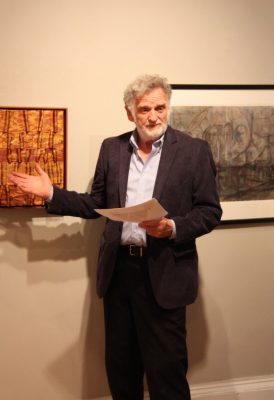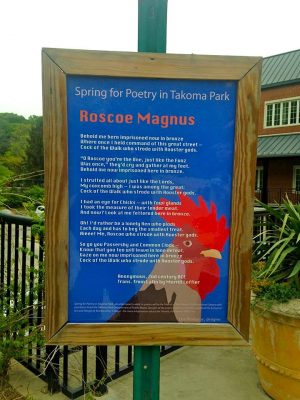“Desperate unhappiness” was the source of Merrill Leffler’s earliest inspiration for writing poetry. Fortunately, the spirits of Takoma Park’s poet laureate have improved considerably since those dark days. The septuagenarian’s achievements as laureate as well as career highlights that include cofounding and editing a poetry magazine that evolved into a small press, teaching on the university level and publishing three volumes of poetry have made for a satisfying life.
A combination of factors appears to have influenced his success. Foremost among them are being reared in the Jewish “immigrant ethos” where education had “a primary place” and his steadfast commitment to writing.
Raised in Brooklyn, Long Island and High Point, N.C., Leffler is the oldest of three children of parents who did not finish high school. “My father ran the shipping department of a paper distributor and my mother worked part-time in a children’s clothing store owned by one of her sisters,” he said.
For much of his youth, Leffler expected to become an engineer. Reading novels by Thomas Wolfe and Fyodor Dostoevsky during his senior year of high school led him to consider a liberal arts education instead. But his mother’s sudden death, he said, “changed everything,” and he entered North Carolina State University as an engineering major. “It felt like a straitjacketed program, which I was not adept at,” he recalled, prompting him to switch to physics and math. “I wasn’t a natural at that either, but I managed to make my way through.”
Post-college, joining the Peace Corps was Leffler’s preference, but his father pressured him to take a job at the NASA Langley Research Center in Hampton, Va. There, he worked “for a fine man whose work was deploying small rockets that carried an inflatable balloon 50 or so miles up, which were then released. Radar was used for tracking the balloon to determine wind shears and, through knowing the rate of descent, you could calculate air density.” Leffler credits his lack of engagement with the job for planting the seeds of his future. “For the first time, I found myself writing poems–poems of despair!”

At age 22, Leffler relocated to Washington, D.C., to work at the Goddard Space Flight Center as “a vehicle manager for the Aerobee, a large two-stage rocket that took scientific experiments into the atmosphere,” he said. All the while, “I was writing poems, reading novels, going to museums–and feeling that I couldn’t do engineering work for the rest of my life.” Rather, Leffler said, “I felt I needed to read, to study, to go back to school” and ultimately, earn a living as a writer.
He followed through by taking literature classes at University College Maryland. At about the same time, he married (Ann Slayton, “a delicate writer of poetry and prose”), started Dryad Press and did a three-year fellowship at Oxford University. Upon returning to Maryland, Leffler completed his graduate work and became an assistant professor of English literature at the U.S. Naval Academy. He and Slayton rented a place in Takoma Park, which they valued for its “funkiness,” and rented until they could buy the house they have lived in since 1979. “I love Takoma Park and the neighborhood we’re in,” he said. “Ann and I have been actively involved, arts-wise and politically.”
Teaching did not satisfy Leffler either. “I had been writing book reviews and discovered that in addition to poetry and literature, I loved writing about science,” he recalled. This led to another job change, a science writing position with the University of Maryland Sea Grant Program. “Writing about Chesapeake Bay science and policy,” he said, “was wonderful work.”
Leffler became Takoma Park’s third poet laureate in 2011; he remembers being surprised to learn “a modest honorarium” accompanies the position. Each laureate takes on the job in their own way, said Leffler, pointing to Don Berger who started the still-flourishing Third Thursday Reading Series and Anne Becker who orchestrated successful artist-poet collaborations and continues to lead a monthly workshop.
Becker, who dates her friendship with Leffler to the small D.C. poetry community of the late 1960s and ’70s, described Leffler as “a tall man with curly graying hair, wonderful bushy eyebrows (and) a craggy face full of character and humor.” She called him “a man of wordmusic. You will hear it in the poems he writes and you will hear it in his voice when he speaks.”
During Leffler’s tenure as poet laureate, he has read poems at various functions—“for example, at the dedication of the bronze sculpture of Sam Abbott, which hangs at the entryway to the Sam Abbot Community Center,” and the upcoming Feb. 4 Public Teach-in on Takoma Park as a Sanctuary City. He also has been organizing and introducing poets at the Third Thursday Series and writing a “Vox Poetica” column for the Takoma Voice. “I stopped writing when the paper went solely online,” he said. “But I plan to start again in March.”.

Perhaps Leffler’s most valuable cultural contribution to his community is Takoma Park’s Spring for Poetry Walk, which he and Slayton initiated in 2007 with the support of the Friends of the Takoma Park Library. As part of the annual event, Leffler works with Professor Andrea Adams of Montgomery College’s School of Art and Design, whose second-year students design poetry posters, which are installed for a six-month period all around the city. “I love our Spring for Poetry in Takoma Park posters because they have become part of the cityscape,” Leffler said. “I’ve heard from many people how much they appreciate having them on the streets,” adding, “Will it continue after me? Unless someone steps up, not likely.”
Then there is Dryad Press. “While Neil Lehrman and I began Dryad as a poetry press, I’ve taken it in other directions–publishing fiction and non-fiction. I’ve worked with some terrific authors and, in these last 15-plus years, with the designer Sandy Rodgers,” Leffler said. In 2015, the Association of Jewish Libraries gave him an award for publishing Jewish literary works, yet he emphatically stated that he thinks of himself as a literary rather than a Jewish book publisher. “Books that matter—I’ll call them ‘literary books’— stimulate the mind; they give us deep pleasures and deep insights,” he said at the awards presentation. “They often disrupt the beliefs we take for granted and don’t question; they inform us more deeply about what we know— or think we know—to teach us about the world and about ourselves.”
As for his assessment of the current state of poetry, Leffler said, it is “overwhelming! There are many different poetries in the U.S., from the personal lyric to the equivalent of abstract expressionism, (that is) language and improvisational poetry, surrealism, performance, rap. This doesn’t cover it. Because of the many creative writing programs in middle and high schools through colleges, I think many more students are getting a feel for these different poetries, that it is not simply an academic study.”
Leffler’s dedication to the literary life is unwavering. “From the beginning,” Becker observed, “Merrill has been indefatigable, fostering the love of poetry in his students, encouraging poets in their work and bringing poetry to a larger audience.” In addition to writing in a journal daily, as he has for more than 40 years, he reviews books, most recently for the Jewish Book Council, and intends to create an anthology of poems related to Spinoza with the working title, “Spinoza Amidst the Poets.”
For information on Takoma Park’s arts and humanities programs and events, visit https://takomaparkmd.gov/initiatives/arts-and-humanities. View City of Takoma Park’s upcoming events on CultureSpotMC here.